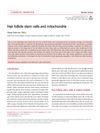 March 2024 in “PLoS medicine”
March 2024 in “PLoS medicine” Physical activity, height, and smoking affect prostate cancer risk.
 February 2024 in “Frontiers in physiology”
February 2024 in “Frontiers in physiology” Lymphatic vessels are important for skin repair and could affect skin disease treatments.
 February 2024 in “International journal of biology, pharmacy and allied sciences”
February 2024 in “International journal of biology, pharmacy and allied sciences” Plant-based treatments can effectively and safely treat hair loss.
 February 2024 in “International Journal For Multidisciplinary Research”
February 2024 in “International Journal For Multidisciplinary Research” Nanostructured lipid carriers are effective for treating hyperpigmentation in women aged 30-40.
 January 2024 in “Biological & clinical sciences research journal”
January 2024 in “Biological & clinical sciences research journal” Apigenin, found in plants and vegetables, has many health benefits, including anti-inflammatory, antioxidant, and anticancer effects.
 January 2024 in “Polski Merkuriusz Lekarski”
January 2024 in “Polski Merkuriusz Lekarski” Pica disorder in central Iraq is mainly found in females and is linked to low iron levels; treatment with iron improves most patients.
 January 2024 in “Wiadomości Lekarskie”
January 2024 in “Wiadomości Lekarskie” Robotic hair transplantation with AI offers more reliable, precise, and efficient hair restoration.
 November 2023 in “Frontiers in cell and developmental biology”
November 2023 in “Frontiers in cell and developmental biology” Hair aging is caused by stress, hormones, inflammation, and DNA damage affecting hair growth and color.
 November 2023 in “bioRxiv (Cold Spring Harbor Laboratory)”
November 2023 in “bioRxiv (Cold Spring Harbor Laboratory)” Disrupted cholesterol production impairs hair follicle stem cells, leading to hair loss.
 October 2023 in “Journal of Medicine, University of Santo Tomas (JMUST Online)”
October 2023 in “Journal of Medicine, University of Santo Tomas (JMUST Online)” Elderly patients frequently suffer from skin conditions, especially inflammatory ones, highlighting the need for better healthcare.
 August 2023 in “International journal of research in Ayurveda and pharmacy”
August 2023 in “International journal of research in Ayurveda and pharmacy” Garudan Kizhangu Ennai may effectively treat alopecia areata but needs more research to confirm its safety and effectiveness.
 August 2023 in “The Indonesian Biomedical Journal”
August 2023 in “The Indonesian Biomedical Journal” Rosemary essential oil improved hair growth and thickness in UVB-exposed mice.
 July 2023 in “Frontiers in veterinary science”
July 2023 in “Frontiers in veterinary science” Certain long non-coding RNAs are important for controlling hair growth cycles in sheep.
 June 2023 in “Journal of multidisciplinary sciences”
June 2023 in “Journal of multidisciplinary sciences” PCOS may increase the risk of certain cancers.
 June 2023 in “Journal of multidisciplinary sciences (Online)”
June 2023 in “Journal of multidisciplinary sciences (Online)” PCOS is linked to a higher risk of endometrial cancer but not ovarian or breast cancer, and more research is needed on its role in cancer development and treatment effects.
 June 2023 in “Journal of cosmetic medicine”
June 2023 in “Journal of cosmetic medicine” Hair follicle stem cells and mitochondria are key for hair growth, and targeting their activity could lead to new hair loss treatments.
 May 2023 in “Journal of Pharmaceutical Research”
May 2023 in “Journal of Pharmaceutical Research” Neem is highly beneficial for health and beauty with no major side effects.

Tiny particles called extracellular vesicles show potential for improving skin health in cosmetics, but more research is needed to confirm their safety and effectiveness.

Custom skincare can be made based on genes, fewer cats in Lublin have FeLV/FIV than national average, and studies also looked at small water bodies, river pollution, guppy growth, toxins in biochars, palm oil issues, and pumpkin seed oil for hair strength.

Higher TGF-β signaling may increase skin cancer risk in organ transplant recipients.
 February 2023 in “Sibirskij onkologičeskij žurnal”
February 2023 in “Sibirskij onkologičeskij žurnal” Chemotherapy often causes hair loss in cancer patients, affecting their mental health, but scalp cooling can help prevent it.
 January 2023 in “Biocell”
January 2023 in “Biocell” Safflower extract helps protect hair follicle cells from damage caused by chemotherapy.
 January 2023 in “European endocrinology”
January 2023 in “European endocrinology” People with alopecia have a higher risk of thyroid cancer.
 November 2022 in “CARDIOMETRY”
November 2022 in “CARDIOMETRY” A group has developed therapies that show promise for treating cancer and various other conditions.
 November 2022 in “Research Square (Research Square)”
November 2022 in “Research Square (Research Square)” The research provides insights into hair follicle growth in forest musk deer by identifying key genes and pathways involved.
 October 2022 in “International Journal For Multidisciplinary Research”
October 2022 in “International Journal For Multidisciplinary Research” Hibiscus flowers have many medicinal benefits and are generally safe.
 September 2022 in “Research Square (Research Square)”
September 2022 in “Research Square (Research Square)” Increasing Rps14 helps grow more inner ear cells and repair hearing cells in baby mice.

The document concludes that the development of certain tumors is influenced by genetic background and that a specific gene modification can lead to tumor regression and reduced growth.

Researchers found a genetic link for hereditary hair loss but need more analysis to identify the exact gene.
 June 2021 in “Research Square (Research Square)”
June 2021 in “Research Square (Research Square)” The exact identity of skin stem cells and how skin cells differentiate is not fully known.






























